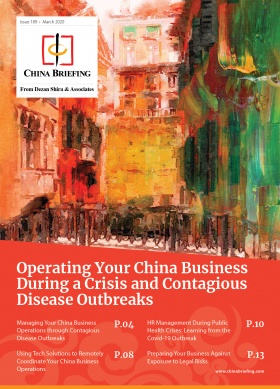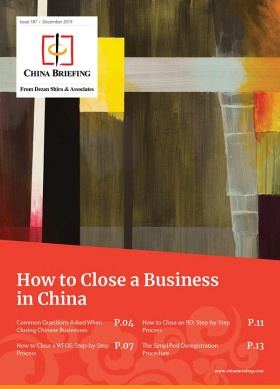Tax and Fee Cuts Announced in China’s 2020 Work Report: Two Sessions Roundup
China will reduce business expenses by over RMB 2.5 trillion (US$350 billion) this year, including RMB 500 billion (US$70 billion) in new tax and fee cuts, in an effort to help the economy recover from the downturn caused by the COVID-19 coronavirus outbreak.
The announcement was included in Chinese Premier Li Keqiang’s annual Work Report, which he delivered at the recently concluded Two Sessions meetings in Beijing.
The tax and fee cuts mark a continuation of the government’s multi-year effort to create a business environment more conducive to private business. In the Work Report, Li said that the government cut taxes and fees by RMB 2.36 trillion (US$332.3 billion) in 2019, exceeding the goal of RMB 2 trillion (281.6 billion).
From January to April this year, the government had already cut taxes and fees by RMB 906.6 billion (US$127 billion). RMB 485.7 billion (US$68.4 billion) of this came in the form of COVID-19 relief measures and RMB 420.9 billion (US$59.3 billion) came from the wider implementation of preferential policies announced last year.
The tax and fee cuts announced in the 2020 Work Report come from a combination of new measures and the extension of emergency policies released earlier in the year in response to COVID-19.
Together, the tax and fee cuts offer targeted relief for businesses most impacted by the economic crisis induced by COVID-19.
VAT and pension insurance rate reductions
In the Work Report, Li announced that the government would further reduce value-added tax (VAT) rates and pension insurance rates in 2020. The Report did not offer details regarding how the government will accomplish these tasks.
China currently has three VAT brackets for general taxpayers: 13 percent for the manufacturing sector; 9 percent for construction and transport; and six percent for services.
In the 2019 Work Report, Li had also announced VAT tax cuts and said that tax authorities were exploring the possibility of streamlining the VAT system from three brackets into two. This year, Li made no mention of the possibility of streamlining, which suggests that the existing system will likely stay in place for the rest of the year – but potentially with lower rates.
Last year’s Work Report had cut pension contribution rates for employers, lowering the standard obligation from 20 percent to 16 percent. No specifics on how the pension insurance will be reduced were offered.
As such, a more detailed announcement from relevant authorities can be expected in coming months.
Extending preferential tax and fee policies
According to the Work Report, the government will extend various preferential tax and fee policies that it previously introduced to ease the burden of businesses amid the coronavirus outbreak. These policies were set to expire in June but will instead be in place until the end of 2020.
Specifically, the government will extend the exemptions on pension, unemployment insurance, and work injury insurance contributions for small, micro, and medium-sized enterprises. These were initially introduced in the Notice on the Periodic Reduction and Exemption of Corporate Social Insurance Premiums jointly released by the Ministry of Human Resources and Social Security, the Ministry of Finance, and the State Taxation Administration on February 20.
The Work Report also confirmed the extension of preferential policies for small-scale VAT taxpayers until the end of the year, including additional support for firms in Hubei province – the epicenter of the COVID-19 outbreak.
According to these policies, small-scale taxpayers subject to three percent VAT levies can enjoy a preferential one percent rate, while those in Hubei can have their three percent VAT levies exempted altogether. These policies were originally released in STA Announcement [2020] No. 13 on February 2020, and the policy’s extension was already made public in STA Announcement [2020] No. 24 on May 7.
Further, the 2020 Work Report stated that tax authorities will extend VAT exemptions for industries impacted by COVID-19, including public transportation, catering and hospitality, tourism and entertainment, and culture and sports.
Finally, Li said that tax collectors have postponed income tax payments for small low-profit enterprises and sole proprietors until next year. These firms still need to file prepayment declarations for their tax obligations in order to qualify for the deferral.
China’s targeted approach to stimulus
At the closing press conference of the Two Sessions Congress on May 28, Chinese Premier Li Keqiang said that the government expects positive economic growth in 2020, despite not setting a GDP growth target for the first time in decades. According to Li, China can accomplish positive economic growth by implementing targeted relief measures that tangibly help businesses, as opposed to “floodgate” government spending.
The targeted approach to economic recovery based on tax and fee cuts stands in contrast to its response to the 2008 financial crisis, when China spent billions of dollars on infrastructure and construction. Instead of turning towards expensive – and oftentimes inefficient – investment projects that disproportionally benefit state-owned enterprises, Li stressed targeted measures like tax cuts, fee reductions, and social insurance exemptions. Still, infrastructure investment is a key part of the wider RMB 3.6 trillion (US$506 billion) stimulus package that the government announced in this year’s Work Report.
Nevertheless, while the government’s stimulus approach to the COVID-19 crisis is more restrained than its response to the 2008 financial crisis, Li said that the government is prepared to spend more if necessary. “China reserves policy room for more measures, either on fiscal, finance, and social security,” Li said at the press conference. “We are in a strong position to introduce new measures.”
Because of the unpredictable nature of COVID-19 on the global economy, the Chinese government is taking an incremental approach to stimulus and relief measures based on need. Accordingly, the government appears willing to release new supportive measures for businesses if the Chinese economy is in need of stronger support in the months ahead.
About Us
China Briefing is written and produced by Dezan Shira & Associates. The practice assists foreign investors into China and has done so since 1992 through offices in Beijing, Tianjin, Dalian, Qingdao, Shanghai, Hangzhou, Ningbo, Suzhou, Guangzhou, Dongguan, Zhongshan, Shenzhen, and Hong Kong. Please contact the firm for assistance in China at china@dezshira.com.
We also maintain offices assisting foreign investors in Vietnam, Indonesia, Singapore, The Philippines, Malaysia, Thailand, United States, and Italy, in addition to our practices in India and Russia and our trade research facilities along the Belt & Road Initiative.
- Previous Article China Extends VAT Preferential Policy for Small-Scale Taxpayers to the End of 2020
- Next Article China Announces More Fee Cuts, Companies Expected to Save RMB 310 billion in 2020




























